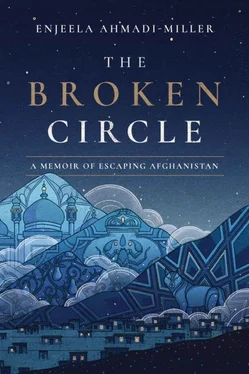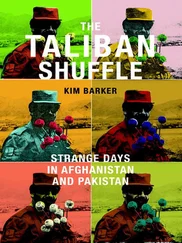Now I stood in the midst of a joyful celebration, and it kindled something inside me—maybe I could experience this one day.
Soon it was time for the wedding to begin, and we filed outside to wait for the groom to arrive. The groom, dressed in a yellow robe with a turban on his head, came into sight atop an elephant that lumbered slowly down the road. A cascade of velvety white flowers draped down from his turban, hiding his face. The beast was surrounded by the groom’s family and friends, singing as they marched down the street. The huge animal had a painted face and was decorated with flowers. As it came near, I wanted to run over and touch it, but Mommy held me back.
The procession stopped in front of the house. The groom dismounted. And surrounded by family, he strode forward. The bride came out of the house accompanied by her father. When he presented her, and the young man took her hand, a lump caught in my throat. Even my normally stoic father seemed moved by the moment.
After the presentation, it was time to leave for the hall where the ceremony would take place. The bride and groom left, and the entire throng made their way to the reception hall. After everyone was seated, the bride was escorted to a chair under the mandap , an ornate canopy held up by pillars wrapped in flowers and garlands.
Their parents sat on each side of them, and the priest read them their marital responsibilities. The sacrificial altar was lit and the couple circled it seven times, each time reciting a promise to each other. Only after the circling was complete were they announced as husband and wife.
Once the celebration was over, the feasting began. They served naan with a variety of curries, samosas (savory pastries with spiced vegetable fillings), fragrant rice, pakoras (fritters), paneers (cheeses), nuts, sweet cakes. All of this was topped off with desserts of ice cream and fruit. I ate a bit of everything and watched the dancers, listening to the music late into the night. I went home full and happy and ready to attend another wedding. I wouldn’t at all have minded having one of those for myself—someday.
Life for me in India became a fabric of events that fit well into my life. As the year progressed, I found it more difficult to sense the distinction between the old me, used to the old ways, and the new me, here in New Delhi. The colors and customs of this amazing country filled my imagination. I could see myself growing older here, finishing school, and maybe watching some handsome young man ride down the road atop an elephant to ask Padar for my hand. Why not? Everything seemed possible.
Padar continued to leave every morning looking for work, making calls, checking out opportunities to create a new life in New Delhi. Mommy remained active, though her energy wasn’t the same; some days she had to rest longer than usual. She kept us busy, making sure we were good students, that we stayed with our lessons—Vida with her dancing, and me with my singing. By the end of that first term, my Hindi became so fluid some began to think of me as a native speaker. The language even became part of my thoughts. Along with the food, the boys, the festivals and celebrations, which never ended.
Holi is the customary festival that celebrates the changing of the seasons from winter to spring. Vida and I embraced it with special enthusiasm. It’s called the Festival of Colors, and that’s exactly what it was. For weeks leading up to the day, stores sold packets of colored powder: fiery orange, ocean blue, hot pink, lemon yellow, deep purple, crimson red—all the colors of the rainbow in iridescent hues. Each time we went to our favorite markets, we would stand by the stalls that sold the powder from silver bowls you could purchase by the scoopful. We’d dip our fingers in the powder and smear it on each other’s faces until the dissatisfied glares of the shop owners chased us away.
On the day of the festival itself, we dressed in white clothes and stood in groups out on the street, where the whole neighborhood was gathered. With our stash of packets, we commenced to pelt each other with the colored powder, creating a cloud of colors that enveloped everything. I heard laughter and shouting, but I couldn’t see a thing. Not even Vida, who was beside me. When the dust settled, everyone was covered in a rainbow of hues, from our hair down to our feet. I recognized friends only by the white of their teeth that gleamed as they laughed.
Spring, Mommy explained, is a beginning, a time of growth, a time to sweep out the old and usher in the new. That night as I showered off the powder, the vigor of the day did make me feel renewed. I had washed off the refugee. I laughed at how much fun a change of season could be.
It was July, and Vida and I sat outside the door of Mommy’s doctor’s office. Padar had asked us to wait in the hall while the physician discussed her latest exam, so we sat on a crowded, hard wooden bench inside the district hospital. The heat and humidity threatened to melt our clothes off. Mommy’s breathing had become more labored the last couple of weeks, and her energy had flagged to the point of lethargy. We had been here many times before, and after we stepped into the hall, I had left the door open a crack so that Vida and I could lean forward on the bench and grab what we could of the conversation.
Heart attack. Options. Bypass. Life-threatening.
The doctor went on to say that she needed the surgery and that her life would be in danger if she didn’t have it immediately. Vida and I looked at each other and held each other’s hands for strength. I expected my parents to have solemn expressions on their faces when they came out of the office. But that wasn’t the case. Mommy was as cheerful and positive as ever, and Padar possessed his usual poetic stoicism, as if everything that happened had been foretold in a verse of Hafiz or Rumi. I knew he went to his memory for comfort as he supported Mommy, who walked with a slight stoop and roll of her shoulders as she shuffled her feet down the hall toward the door.
A week later she lay on a gurney in a hospital room, wearing a blue surgical cap over her hair, covered in a white sheet. While a nurse hooked an IV up to her arm, the whole family gathered around her. She blew kisses and said not to worry, that she would see all of us soon. She kept a smile up even when they wheeled her out of the room.
I followed her down the hall.
“Mommy, Mommy,” I whispered as I walked beside the gurney. I twined my fingers in her hand and held on until we approached the double doors of the operation theater.
Though her eyes were heavy with fatigue, she lifted her head a bit. “It will be all right, Enjeela. I will see you soon. Stay with your brothers and sisters.” She squeezed my hand once, then let go. Padar took my hand and pulled me away. I watched as she disappeared into the room full of equipment and nurses and doctors until the doors swung shut.
We gathered in a small waiting room. The day was already hot and stinky with humidity when we arrived, but I felt suddenly chilled, slumped on the plastic chair. My brothers talked softly to each other about a game of cricket they were going to play with friends tomorrow. Shapairi stared off at a corner of the ceiling. Laila and Zulaikha sat on the floor, leaning against a wall. Padar sat next to me reading a book of poems. Shapairi asked if Laila had remembered to lock the front door this morning. Laila said she couldn’t remember. That it would be okay. Zia said he had left his cricket bat in the living room. Somebody could steal it. Padar kept reading, burying himself in words. No one mentioned dying or death, only what we might cook for dinner or if it might rain. Each hour that passed, my stomach grew heavier, a weight falling into my legs. At dinnertime the doctor came into the room, still in his scrubs.
Читать дальше












